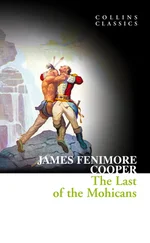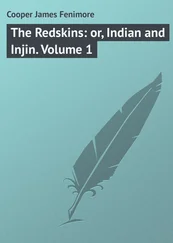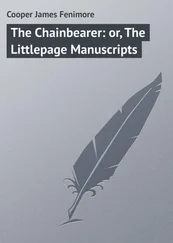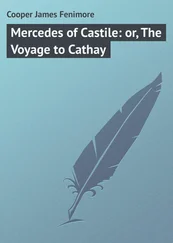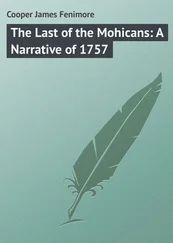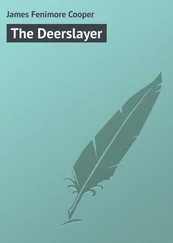James Cooper - The Deerslayer
Здесь есть возможность читать онлайн «James Cooper - The Deerslayer» — ознакомительный отрывок электронной книги совершенно бесплатно, а после прочтения отрывка купить полную версию. В некоторых случаях можно слушать аудио, скачать через торрент в формате fb2 и присутствует краткое содержание. Жанр: unrecognised, на английском языке. Описание произведения, (предисловие) а так же отзывы посетителей доступны на портале библиотеки ЛибКат.
- Название:The Deerslayer
- Автор:
- Жанр:
- Год:неизвестен
- ISBN:нет данных
- Рейтинг книги:5 / 5. Голосов: 1
-
Избранное:Добавить в избранное
- Отзывы:
-
Ваша оценка:
- 100
- 1
- 2
- 3
- 4
- 5
The Deerslayer: краткое содержание, описание и аннотация
Предлагаем к чтению аннотацию, описание, краткое содержание или предисловие (зависит от того, что написал сам автор книги «The Deerslayer»). Если вы не нашли необходимую информацию о книге — напишите в комментариях, мы постараемся отыскать её.
Immerse yourself in well-known and popular titles!
The Deerslayer — читать онлайн ознакомительный отрывок
Ниже представлен текст книги, разбитый по страницам. Система сохранения места последней прочитанной страницы, позволяет с удобством читать онлайн бесплатно книгу «The Deerslayer», без необходимости каждый раз заново искать на чём Вы остановились. Поставьте закладку, и сможете в любой момент перейти на страницу, на которой закончили чтение.
Интервал:
Закладка:
Titel: The Deerslayer
von Augustus J. Thebaud, Charles Kingsley, Henry James, Thomas Hardy, Kate Douglas Smith Wiggin, Joseph Butler, John D. Barry, William Allan Neilson, Henry Rider Haggard, Rudolf Erich Raspe, Paul Heyse, Carl Russell Fish, Tom Taylor, Margaret Pedler, Homer, John Kendrick Bangs, John Burroughs, Juanita Helm Floyd, Maurice Liber, Anthony Trollope, William Morris, Mark Twain, Charles Dudley Warner, Thomas Hobbes, Winfried Honig, Albrecht Dürer, Militia of Mercy . Gift Book Committee, Ella Wheeler Wilcox, Andrew Lang, Katharine Pyle, Sir Samuel White Baker, Frederic William Moorman, the Younger Pliny, Samuel Butler, William Dean Howells, Harold MacGrath, Joseph Crosby Lincoln, Ralph Connor, Various, Oliver Wendell Holmes, Abraham Lincoln, John Galsworthy, Ian Maclaren, Charlotte Mary Yonge, Sir Owen Morgan Edwards, Robert J. C. Stead, Harold Bell Wright, Eleanor H. Porter, Richard Le Gallienne, Ann Ward Radcliffe, Mark Rutherford, John Bunyan, Artemus Ward, John Hanning Speke, James Fenimore Cooper
ISBN 978-3-7429-3170-2
Alle Rechte vorbehalten.
Es ist ohne vorherige schriftliche Erlaubnis nicht gestattet, dieses Werk im Ganzen oder in Teilen zu vervielfältigen oder zu veröffentlichen.
THE DEERSLAYER
By James Fenimore Cooper
Contents
Chapter I. Chapter II. Chapter III. Chapter IV. Chapter V. Chapter VI. Chapter VII. Chapter VIII. |
Chapter IX. Chapter X. Chapter XI. Chapter XII. Chapter XIII. Chapter XIV. Chapter XV. Chapter XVI | Chapter XVII. Chapter XVIII Chapter XIX Chapter XX Chapter XXI. Chapter XXII. Chapter XXIII. Chapter XXIV | Chapter XXV Chapter XXVI. Chapter XXVII. Chapter XXVIII. Chapter XXIX. Chapter XXX. Chapter XXXI. Chapter XXXII |
Chapter I.
On the human imagination events produce the effects of time. Thus, he who has travelled far and seen much is apt to fancy that he has lived long; and the history that most abounds in important incidents soonest assumes the aspect of antiquity. In no other way can we account for the venerable air that is already gathering around American annals. When the mind reverts to the earliest days of colonial history, the period seems remote and obscure, the thousand changes that thicken along the links of recollections, throwing back the origin of the nation to a day so distant as seemingly to reach the mists of time; and yet four lives of ordinary duration would suffice to transmit, from mouth to mouth, in the form of tradition, all that civilized man has achieved within the limits of the republic. Although New York alone possesses a population materially exceeding that of either of the four smallest kingdoms of Europe, or materially exceeding that of the entire Swiss Confederation, it is little more than two centuries since the Dutch commenced their settlement, rescuing the region from the savage state. Thus, what seems venerable by an accumulation of changes is reduced to familiarity when we come seriously to consider it solely in connection with time.
This glance into the perspective of the past will prepare the reader to look at the pictures we are about to sketch, with less surprise than he might otherwise feel; and a few additional explanations may carry him back in imagination to the precise condition of society that we desire to delineate. It is matter of history that the settlements on the eastern shores of the Hudson, such as Claverack, Kinderhook, and even Poughkeepsie, were not regarded as safe from Indian incursions a century since; and there is still standing on the banks of the same river, and within musket-shot of the wharves of Albany, a residence of a younger branch of the Van Rensselaers, that has loopholes constructed for defence against the same crafty enemy, although it dates from a period scarcely so distant. Other similar memorials of the infancy of the country are to be found, scattered through what is now deemed the very centre of American civilization, affording the plainest proofs that all we possess of security from invasion and hostile violence is the growth of but little more than the time that is frequently fulfilled by a single human life.
The incidents of this tale occurred between the years 1740 and 1745, when the settled portions of the colony of New York were confined to the four Atlantic counties, a narrow belt of country on each side of the Hudson, extending from its mouth to the falls near its head, and to a few advanced "neighborhoods" on the Mohawk and the Schoharie. Broad belts of the virgin wilderness not only reached the shores of the first river, but they even crossed it, stretching away into New England, and affording forest covers to the noiseless moccasin of the native warrior, as he trod the secret and bloody war-path. A bird's-eye view of the whole region east of the Mississippi must then have offered one vast expanse of woods, relieved by a comparatively narrow fringe of cultivation along the sea, dotted by the glittering surfaces of lakes, and intersected by the waving lines of river. In such a vast picture of solemn solitude, the district of country we design to paint sinks into insignificance, though we feel encouraged to proceed by the conviction that, with slight and immaterial distinctions, he who succeeds in giving an accurate idea of any portion of this wild region must necessarily convey a tolerably correct notion of the whole.
Whatever may be the changes produced by man, the eternal round of the seasons is unbroken. Summer and winter, seed-time and harvest, return in their stated order with a sublime precision, affording to man one of the noblest of all the occasions he enjoys of proving the high powers of his far-reaching mind, in compassing the laws that control their exact uniformity, and in calculating their never-ending revolutions.
Centuries of summer suns had warmed the tops of the same noble oaks and pines, sending their heats even to the tenacious roots, when voices were heard calling to each other, in the depths of a forest, of which the leafy surface lay bathed in the brilliant light of a cloudless day in June, while the trunks of the trees rose in gloomy grandeur in the shades beneath. The calls were in different tones, evidently proceeding from two men who had lost their way, and were searching in different directions for their path. At length a shout proclaimed success, and presently a man of gigantic mould broke out of the tangled labyrinth of a small swamp, emerging into an opening that appeared to have been formed partly by the ravages of the wind, and partly by those of fire. This little area, which afforded a good view of the sky, although it was pretty well filled with dead trees, lay on the side of one of the high hills, or low mountains, into which nearly the whole surface of the adjacent country was broken.
"Here is room to breathe in!" exclaimed the liberated forester, as soon as he found himself under a clear sky, shaking his huge frame like a mastiff that has just escaped from a snowbank. "Hurrah! Deerslayer; here is daylight, at last, and yonder is the lake."
These words were scarcely uttered when the second forester dashed aside the bushes of the swamp, and appeared in the area. After making a hurried adjustment of his arms and disordered dress, he joined his companion, who had already begun his disposition for a halt.
"Do you know this spot!" demanded the one called Deerslayer, "or do you shout at the sight of the sun?"
"Both, lad, both; I know the spot, and am not sorry to see so useful a fri'nd as the sun. Now we have got the p'ints of the compass in our minds once more, and 't will be our own faults if we let anything turn them topsy-turvy ag'in, as has just happened. My name is not Hurry Harry, if this be not the very spot where the land-hunters camped the last summer, and passed a week. See I yonder are the dead bushes of their bower, and here is the spring. Much as I like the sun, boy, I've no occasion for it to tell me it is noon; this stomach of mine is as good a time-piece as is to be found in the colony, and it already p'ints to half-past twelve. So open the wallet, and let us wind up for another six hours' run."
Читать дальшеИнтервал:
Закладка:
Похожие книги на «The Deerslayer»
Представляем Вашему вниманию похожие книги на «The Deerslayer» списком для выбора. Мы отобрали схожую по названию и смыслу литературу в надежде предоставить читателям больше вариантов отыскать новые, интересные, ещё непрочитанные произведения.
Обсуждение, отзывы о книге «The Deerslayer» и просто собственные мнения читателей. Оставьте ваши комментарии, напишите, что Вы думаете о произведении, его смысле или главных героях. Укажите что конкретно понравилось, а что нет, и почему Вы так считаете.

![Джеймс Купер - Зверобой, или Первая тропа войны [The Deerslayer, or The First Warpath]](/books/398571/dzhejms-kuper-zveroboj-ili-pervaya-tropa-vojny-the-thumb.webp)




